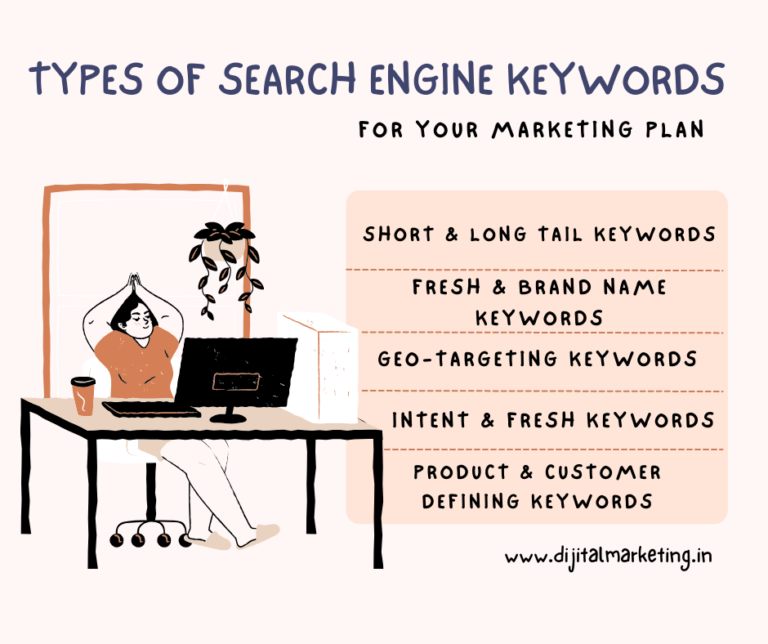Digital marketing involves promoting products or services online through various tools. These include SEO (search engine optimization, which helps improve rankings on search engines), social media(targeting audiences on platforms like Instagram), email marketing (sending tailored emails to specific groups), and advertisements(such as Google pay-per-click ads). This approach enables businesses to connect with customers, enhance their visibility, and easily track their results.

Types of Keywords
1. Short-Tail Keywords
Short-tail keywords are typically one to two words long, such as “shoes,” “laptops,” or “advertising.”
Characteristics:-
– Broad and general.
– High search volume.
– High competition.
Advantages:-
– Can drive significant traffic if ranked well.
Disadvantages:
– Less targeted, which can attract irrelevant audiences.
2. Long-Tail Keywords
Long-tail keywords are more specific phrases, usually consisting of three or more words, like “best running shoes for beginners.”
Characteristics:-
– Low search volume.
– Low competition.
Advantages:-
– Highly targeted and more likely to convert.
– Easier to rank for in search engine results pages (SERPs).
Disadvantages:-
– Attract less traffic compared to short-tail keywords.
3. Branded Keywords
Branded keywords include the name of a company, brand, or product, such as “Nike shoes” or “Apple MacBook.”
Characteristics:-
– Directly related to a specific brand.
– High intent from users familiar with the brand.
Advantages:-
– Generate traffic from users specifically searching for your products or services.
Disadvantages:-
– Limited audience reach to those already aware of the brand.
4. Non-Branded Keywords
Non-branded keywords do not include brand names and focus on general terms, such as “best smartphones” or “top laptops.”
Characteristics:-
– Broader audience reach.
– Often targeted for new customer acquisition.
Advantages:-
– Help attract customers who are unaware of your brand.
Disadvantages:-
– Higher competition compared to branded keywords.
5. Geo-Targeted Keywords
Geo-targeted keywords incorporate location-specific terms, such as “digital marketing agency in New York.”
Characteristics:-
– Focused on local search intent.
Advantages:-
– Attract local customers.
– Boost local SEO efforts.
Disadvantages:-
– Limited to a specific geographic area.
6. Transactional Keywords
Transactional keywords indicate that the user is ready to take action, such as “buy,” “Price,” “offer,” or “get now,” for example, ” running shoe price and offer.”
Characteristics:-
– High commercial intent.
Advantages:-
– Directly lead to conversions.
Disadvantages:-
– High competition.
7. Informational Keywords
Informational keywords cater to users seeking knowledge, such as “how to start a blog” or “benefits of yoga.”
Characteristics:-
– Low commercial intent.
Advantages:-
– Attract a large audience.
– Help build trust and brand authority.
Disadvantages:-
– May not lead directly to sales.
8. Navigational Keywords
Navigational keywords are used when users know where they want to go, such as “Facebook login” or “Amazon customer service.”
Characteristics:-
– High brand affiliation.
Advantages:-
– Drive direct traffic to your website.
Disadvantages:-
– Limited to existing customers or those familiar with your brand.
9. Fresh Keywords
Fresh key phrases are those that relate to present-day traits. You can upload those fresh keywords in your content material to power in on-the-spot traffic, but count on this site visitors to drop when the topic is no longer relevant.
Characteristics:-
– High Volume
Advantages:-
– High relevance and immediate traffic.
Disadvantages:-
– Short-lived effectiveness.
10. LSI (Latent Semantic Indexing) Keywords
LSI keywords are related terms and phrases that provide context to the main keyword, such as “SEO strategies” and “SEO tips.”
Characteristics:-
– Improve content relevance.
Advantages:-
– Help with ranking by providing context for search engines.
11. EverGreen Keywords
Evergreen keywords are consistently relevant search terms that remain in demand over time, focusing on timeless topics like “how to stay healthy” or “How to earn online.”
Characteristics:-
– High Competition
Advantages:-
– They provide sustained traffic and long-term engagement, making them ideal for building consistency.
Disadvantages:-
– High competition makes it challenging to rank, requiring exceptional content and optimization efforts.
12. Customer-defining Keywords
Customer-defining keywords are search terms that describe or target a specific audience segment, often including identifiers like “Best Shoes for Women.”
Characteristics:-
– Low Competition
Advantages:-
– They help attract a well-defined audience, increasing the chances of engagement and conversions.
Disadvantages:-
– Their niche focus might limit the overall search volume, potentially reducing broader visibility.
13. Commerical Keywords
Commercial keywords are search terms that indicate user intent to make a purchase or engage in business transactions, such as “buy,” or “Best.”
Characteristics:-
– Relevant Result
Advantages:-
– They drive targeted traffic, increasing conversions and sales.
Disadvantages:-
– They are highly competitive and often costly in advertising. Also, attracting irrelevant clicks can reduce ROI if not carefully targeted.
14. Product Defining Keywords
Product-defining keywords are terms that in particular describe services or products, consisting of “wi-fi headphones,” ” organic coffee,” or “gaming computer.”
Characteristics:-
– High Competition
Advantages:-
– They attract exceptionally applicable traffic from customers actively looking for that product, increasing conversion potential.
Disadvantages:-
– High opposition in sure markets can make it hard to rank without strong optimization or advertising and marketing efforts.
Conclusion
Understanding and effectively using specific types of keywords is essential for a successful digital marketing strategy. Short-tail keywords attract traffic, while long-tail keywords enhance targeting and boost conversions. Branded and non-branded keywords help balance audience reach and brand loyalty. Transactional keywords drive sales, whereas informational keywords build trust. By aligning keyword strategies with business goals, marketers can optimize visibility, engagement, and revenue.